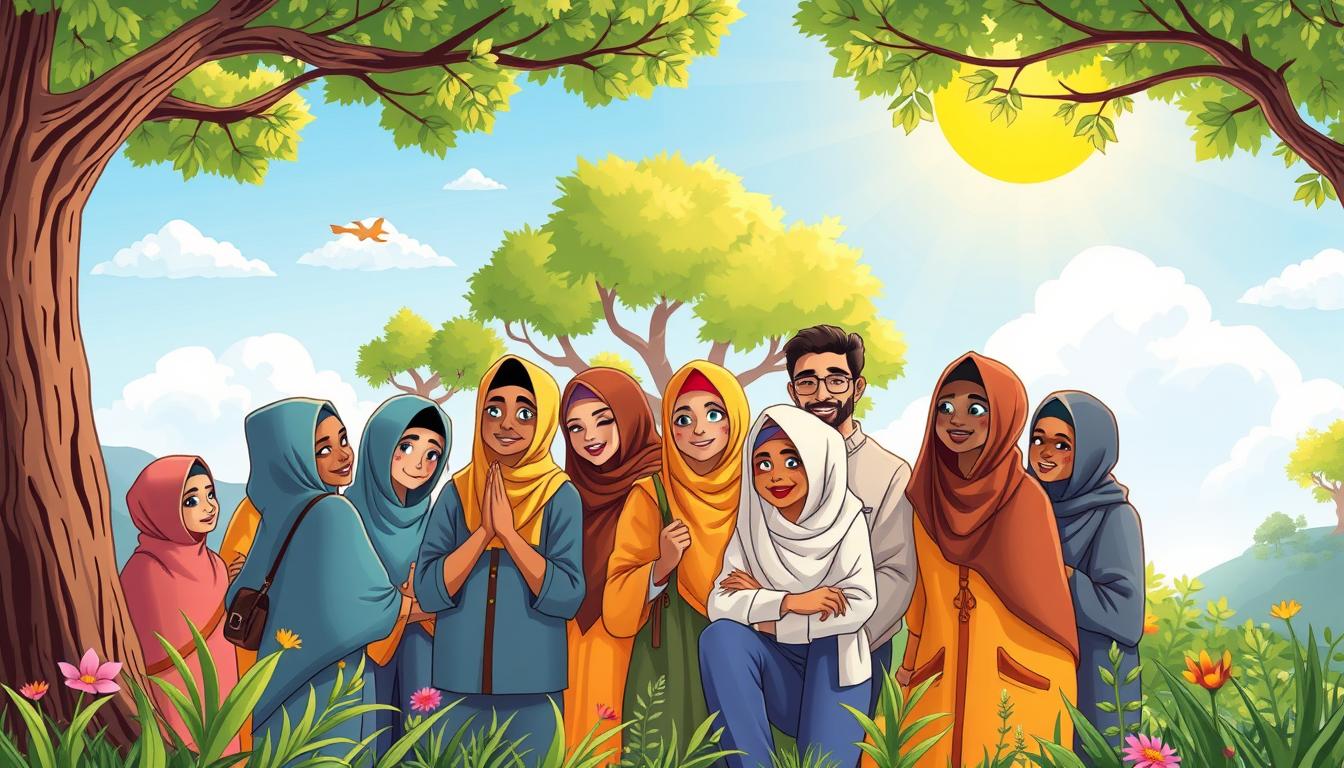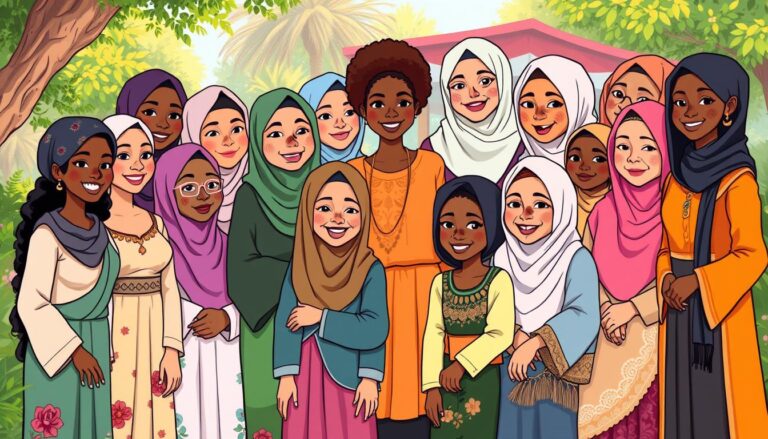How Islam Can Inspire the Next Generation
In a world full of challenges, can Islam be a light of hope for young people? This is a question we deeply consider as we look at how Islamic values can shape a better future.
Islam, with its deep history and timeless teachings, is a source of inspiration for young people. It shows us the power of courage, like Malala Yousafzai, and wisdom, like the Prophet Muhammad (PBUH). These examples show how Islamic values can guide us and bring about positive change.
Malala Yousafzai’s story is a powerful example. At 16, she bravely fought for girls’ education against extremism. Her view of Islam, which values education and equality, contrasts sharply with those who tried to silence her.
The Prophet Muhammad taught us the importance of caring for the young. As Sahih Muslim says, parents have a key role in raising children well. This highlights the need to teach Islamic values early, preparing a generation of faith and resilience.
Key Takeaways
- Islam offers powerful inspiration for youth empowerment
- Malala Yousafzai exemplifies Islamic values of education and courage
- Prophet Muhammad emphasized the importance of nurturing youth
- Islamic teachings provide moral guidance for personal growth
- Combining faith with modern challenges can lead to positive change
The Power of Islamic Values in Shaping Young Minds
Islamic values are key in shaping young Muslims’ character and outlook. They give a strong base for personal growth and guide through life’s ups and downs.
Core Islamic Principles for Personal Growth
The Quran stresses the importance of thinking for oneself and critically. It urges Muslims to deeply engage with their faith. This way, young people can grow and find their identity and purpose.
Instilling Moral Guidance Through Faith
Islamic teachings help in making moral choices. Studies show that those who focus on God have more stable self-esteem. This can improve their relationships, work, and overall happiness.
Fostering Spiritual Development in Youth
Spiritual growth is a big part of Islamic education. The Quran talks about qualities that make a Muslim strong, like striving for Allah and praying regularly. Parents should encourage these virtues in their kids to build a strong spiritual base.
“We have certainly made the Qur’an easy to remember. So is there anyone who will remember?” (Quran 54:17)
Islamic stories are great for spiritual growth in youth. Stories like Prophet Yusuf and Luqman’s adventures teach valuable lessons. Using pictures, talks, and real-life examples can help kids understand these stories and their Islamic values.
Positive Role Models in Islamic History
Islamic history is filled with inspiring figures who show the power of youth empowerment. These Islamic role models prove how young people can change their communities and the world.
Aisha, the wife of Prophet Muhammad, is a great example. By age twenty, she was a respected scholar and jurist. She narrated 2,210 hadiths and guided the Muslim community for 44 years.
Ali ibn Abu Talib is another shining example. He was the first youth to embrace Islam. His courage and noble character made him a symbol of justice, still inspiring young Muslims today.
“The youth in the Islamic community are encouraged to grow in skills and knowledge that not only bring them personal success but also enable them to connect with and inspire a broader audience.”
These historical figures show the potential for youth empowerment in Islam. Their stories motivate young Muslims to get involved in their communities. This leads to personal growth and progress for all.
- 151 items relate to the Prophet’s life (seerah)
- 83 items focus on Reminders under Acts of Worship
- 41 items cover 40 Hadiths on Social Justice
Today, groups like the MWA Youth Advisory Committee (MYAC) keep this tradition alive. They offer young people a chance to share their views on community issues. They also help with charitable causes, following in the footsteps of Islamic role models from the past.
Embracing Identity: American Muslim Youth Perspectives
American Muslim youth face unique challenges in figuring out who they are. A study of 30 young American Muslims showed a variety of experiences. The group had 19 girls and 11 boys, with 15 girls wearing hijab often. All were born in the U.S., and 24 had immigrant parents.
Navigating Multiple Identities
Young Muslims in America often find it hard to mix their religious and national identities. A survey showed that 92% of U.S. Muslims are proud to be American. At the same time, 89% are proud to be both Muslim and American. This mix can be tricky, as 60% of U.S. Muslims feel they share a lot with most Americans.
Overcoming Stereotypes
Muslim youth deal with stereotypes and prejudice. A study by Sana Aaser found that 1 in 3 Muslim kids aged 5-9 didn’t want to share they were Muslim. Young Muslim women find it hard to balance modern fashion with their faith while wearing hijab.
Bridging Generational Gaps
American Muslim youth try to connect different generations in their communities. While 80% feel close to the global Muslim community, 51% have few or no Muslim friends. This diversity in friendships helps young Muslims see different views and understand each other better.
- 87% of married U.S. Muslims have a Muslim spouse
- 80% of U.S. Muslims are satisfied with their lives
- 27% of Muslim men and 25% of hijab-wearing women say their appearance identifies them as Muslim
These numbers show the complex world American Muslim youth live in. They strive to understand their diverse identities in a multicultural society.
Islamic Education and Youth Empowerment
Islamic education is key for empowering youth. Muslim summer camps have grown a lot in the United States. They mix fun summer activities with learning about Islam, helping young people grow spiritually and personally.
The Islamic Society of North America’s Youth Programming Services Department helps Muslim youth. It gives advice, support, and educational materials to help young Muslims on their faith journey.
Groups like the Muslim Student Association unite Muslim students on college campuses. They offer a place for religious and social activities. This helps young Muslims understand their place in a diverse society.
“Adab in Action” is a big part of Islamic youth programs. It teaches about good manners and character through studying the Quran and Hadith.
Islamic education for youth includes:
- Workshops on applying Islamic values in everyday life
- Group talks on challenges Muslim youth face
- Activities to build virtues like empathy and honesty
- Mentorship with inspiring Muslim leaders
- Reflection through journaling and spiritual thinking
These efforts aim to give young Muslims the knowledge and confidence to follow their faith. They also prepare them to be active members of society. By building a strong Islamic foundation, these initiatives help shape the next generation of Muslim leaders and community builders.
How Islam Can Inspire the Next Generation
Islam is a rich source of inspiration for young people today. It teaches them to develop strong leadership skills and think critically.
Cultivating Leadership Skills
Islamic teachings highlight the value of leadership and responsibility. The Prophet Muhammad’s life is a great example of leadership. Young Muslims can learn from his integrity, compassion, and decision-making.
Encouraging Critical Thinking
Islam encourages critical thinking and personal growth. The Quran tells believers to reflect and use reason. This helps young Muslims question, analyze, and form their own opinions.
“Those who listen to the Word and follow the best of it; those are the ones whom Allah has guided, and those are the ones endued with understanding.” – Quran 39:18
Applying Islamic Principles to Modern Challenges
Islamic principles can tackle today’s issues. For example, Islam’s view on caring for the environment can inspire action on climate change. It also motivates young Muslims to fight against inequality and discrimination.
- Use Islamic teachings on compassion to address social issues
- Apply ethical principles from the Quran to navigate complex moral dilemmas
- Draw on Islamic concepts of community to foster unity in diverse societies
By embracing Islamic teachings, the next generation can grow into leaders. They will be ready to face the world’s challenges with confidence and wisdom.
Building Character Through Islamic Practices
Islamic practices are key in building character. The Quran and hadith teach Muslims to be merciful, just, and fair. These teachings help people become strong leaders who inspire their communities.
The Islamic Golden Age lasted over 600 years, starting in the 8th century. During this time, Muslims made big strides in education and learning.
Today, teaching Islamic character is still important. The Tarbiyah Project, started in 1996, works to teach Islamic values to young Muslims. It focuses on:
- Focusing on values, beliefs, and manners
- Developing moral literacy skills
- Inspiring and transforming students through meaningful instruction
Studies show Islamic character education works well. A study at the State University of Sunan Kalijaga Yogyakarta found 83% of students appreciated others’ good actions. This shows Islamic practices help youth become more empathetic.
“Effective Islamic teaching and learning must inspire and transform students in the process of Islamic tarbiyah.”
By following these practices, Muslim youth can grow into caring, just, and understanding individuals. They are prepared to tackle today’s challenges while staying true to their faith.
The Role of Muslim Youth Organizations in Community Development
Muslim youth groups are key in shaping the future. They help in leadership, cultural understanding, and positive change.
Campus Initiatives and Student Associations
The Muslim Student Association (MSA) is vital for many young Muslims. It has branches in the U.S. and Canada. MSA helps students connect, learn, and grow in their faith, helping their university communities too.
Youth-Focused Programs
Groups like the US Council of Muslim Organizations (USCMO) empower Muslim youth. The USCMO’s National Muslim Youth Initiative offers training, mentorship, and service projects. These programs help young Muslims grow, focus on integrity, and prepare for leadership roles.
- Leadership development workshops
- Community service opportunities
- Mentorship programs
Interfaith Activities and Cultural Exchange
Muslim youth groups are involved in interfaith activities and cultural exchanges. These efforts help understand each other, break stereotypes, and build bridges. Young Muslims learn about their faith and others through these programs.
“Our youth are the key to building a more inclusive and compassionate society. Through interfaith dialogue and community service, we can create lasting positive change.”
Muslim youth organizations have a big impact on community development. They strengthen the Muslim community and help the broader society. They promote empathy, justice, and social responsibility.
Islamic Perspectives on Social Justice and Activism
Islam values social justice and activism highly. The Quran teaches us to seek fairness and understand different situations. This has led to more young Muslims getting involved in activism.
Many Muslim groups today follow Islamic social justice. Organizations like the Council on American-Islamic Relations (CAIR) fight for civil rights. They use Islamic teachings to tackle today’s problems.
The idea of ummah, or community, is central to Islamic social justice. It started in 622 C.E. when the Prophet Muhammad created the first Islamic state in Medina. The ummah brought together different groups based on fairness and equality.
We have made you into nations and tribes so that you may know one another.
This Quranic verse shows Islam’s focus on diversity and understanding. It guides young Muslims in their activism today. They work on interfaith projects, disaster relief, and civil rights.
Islamic social justice also talks about economic fairness. Zakat, or charitable giving, is a key part of Islam. It teaches Muslims to help those in need. This idea inspires many Muslim charities around the world.
As Muslim youth face challenges in diverse societies, Islamic social justice offers a way to make a difference. It promotes critical thinking, personal growth, and community involvement.
Integrating Islamic Values with Modern Life
Muslim youth face both challenges and opportunities when blending Islamic values with modern life. Studies show a rise in using spirituality and religion in therapy. This is seen in the creation of Division 36 in the American Psychological Association. It shows the need for methods that respect Muslims’ beliefs while tackling today’s issues.
Balancing Faith and Contemporary Culture
Islamic education helps grow individuals who are responsible and tolerant. A review of 37 articles and six books from 2006 to 2015 found five main themes. These include combining Western psychology with Islamic beliefs. This helps Muslim youth deal with modern life while staying faithful.
Addressing Challenges Faced by Muslim Youth
Cognitive Behavioral Therapy (CBT) is becoming a key method for adapting to religious views in therapy. It pairs well with Islamic teachings, giving Muslim youth tools to face various issues. Parents and teachers who follow Islamic teachings set good examples. This makes Islamic-based teaching more effective in today’s world.
Promoting Inclusivity and Diversity within Islam
Combining STEM education with Islamic values empowers young Muslims to make a difference. Studies show students who see the link between STEM and Islam do better in critical thinking and problem-solving. This approach promotes inclusivity by showing Islam’s fit with science, encouraging Muslim youth to solve global problems while staying true to their faith.
Source Links
- Malala’s Muslim Faith: A Voice Of Islam For The Next Generation
- Raising Strong Children/Future Generation — LEARN ISLAM
- How Islam Spread Throughout the World | Yaqeen Institute for Islamic Research
- Raising Resilient Muslim Youth: Strategies for Building a Strong Muslim Identity in Children | Yaqeen Institute for Islamic Research
- The Power of Storytelling: How Children’s Islamic Stories Can Shape Young Minds?
- Empowering Our Future Leaders – The Importance of Supporting Young People in Islam – Muslim Women Australia
- How the Prophet ﷺ Inspired Young People | Dr. Omar Suleiman | Yaqeen Institute for Islamic Research
- Exploring the Faith and Identity Crisis of American Muslim Youth | Yaqeen Institute for Islamic Research
- 2. Identity, assimilation and community
- Muslim Youth: The Next Generation
- Learning From Past Envisioning Future: The Role of Muslim Youth
- Youth Development
- A Brief History of Islam’s Influence on Indigenous Spirituality — The One Woman Project
- The Impact of Islam
- The Rise of Islam – Livius
- Read Books, Build Character, Inspire Generations | Westwood Mosque
- MET Tarbiyah & Character-Building Program
- NATIONAL MUSLIM YOUTH INITIATIVE – USCMO
- Insights for Muslim American Youth Development: Culturally-Centered Youth Approaches in the Black American Community | Yaqeen Institute for Islamic Research
- The Role of youth in Islam by Mutapha Barry
- A Vision For The Common Good – Dr Muhammad Abdul Bari
- Research Trends in Last Ten Years
- “Guiding the Next Generation: Islamic Principles and Challenges in Children’s Education”
- A Unique Approach to Education – ICE Islamia School







